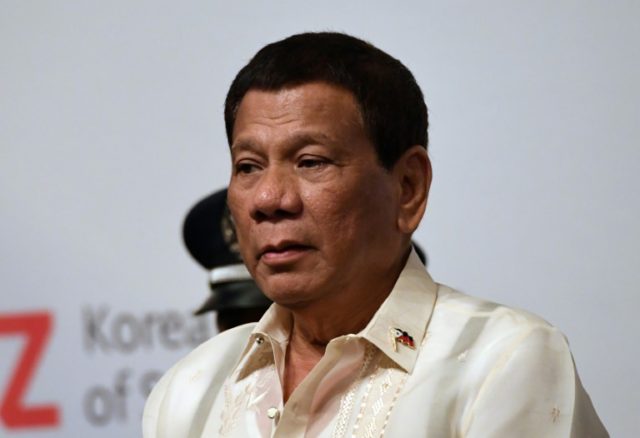Philippines President Rodrigo Duterte praised former leader Ferdinand Marcos on Monday for suggesting the country change its name to Maharlika, a Malay name, in an attempt to erase Spanish “conquest and subjugation.”
The Philippines was named after Spanish King Philip II, who made it possible for explorer Ferdinand Magellan to circumnavigate the globe, eventually reaching the Philippines. The true definition of “Maharlika” remains a matter of debate, though most agree it is a Malay word meaning either “nobility” or a reference to a pre-European feudal warrior class.
Duterte lamented that the name change idea largely fell out of favor because of the brutality of Marcos’ dictatorship.
“Actually, Marcos was right. During the time of Marcos, he wanted it changed. Maharlika. The Republic of Maharlika because Maharlika is a Malay word and it means serenity,” Duterte said at an event to distribute land ownership certificates, radically veering far afield from the topic at hand as he often does at public events.
“[It is called] Philippines because it was discovered by Magellan using the money from King Philip. That’s why when the fool arrived here, he named it ‘Philippines’,” Duterte explained. “But that’s okay. Someday we will change it.”
“The Filipinos were just urged to reject it [the name Maharlika] because they said Marcos was a dictator. Like me, they say I’m a dictator, when did I dictate something?” Duterte continued. “Is it our fault that the Spaniards came here and conquered and subjugated us? The only unfortunate thing was no Muslim missionary came here.”
Duterte went on to claim that Islam reached the Philippines before Christianity, but was largely wiped out because “those sons of bitches” (the Spanish) “came here, killed us all and subjugated us. So for over 400 years, our Malay traits slowly disappeared.”
The remarks are the first time that Duterte proposes the name change, leaving presidential spokesman Salvador Panelo to explain how invested Duterte is in proposing such a change during his regular press conference Tuesday.
“The Constitution provides that Congress may enact a law that can change the name of the country and then submit it to the people for a referendum,” Panelo said. Asked directly if Duterte is serious about the name change, he replied, “Well, I think Maharlika sounds good to the president.”
Panelo added that the name change would require editing the country’s constitution, so Duterte would have to amass support in the nation’s legislature to put forward a realistic pathway to changing the country’s name. A national referendum to gauge public interest would also likely be required.
“The Constitution provides that Congress may enact a law that can change the name of the country and submit it to the people for a referendum,” Panelo explained. “Let’s see how it evolves. He is expressing an idea again as usual.”
The Philippine Star notes that a movement to change the country’s name surfaced in the 1970s, led by then-Senator Eddie Ilarde. The debate resulted in a majority opposing the move, partly due to the lack of clarity in what exactly “Maharlika” means.
“While those who support the name change claimed ‘Maharlika’ connotes royalty, some critics said the term literally means ‘big phallus,'” the Star reports.
Current senators appeared lukewarm to the proposal on Tuesday.
“[I] Need time to study the proposal. This is something new coming from the President. We also need to know the real meaning of the word ‘maharlika,’” Senator Aquilino Pimentel III told the Manila Bulletin. Another senator, Vicente Sotto III, told the newspaper, “Just an idea. Too many implications.”
Members of the Catholic clergy appeared offended at the idea, as it would strip the Christian heritage of the country out of the name.
“It is distasteful for Duterte to change the name of our country especially at this time when we are remembering history,” Sorsogon Bishop Arturo Bastes told the Bulletin, noting that the Philippines will celebrate 500 years of the arrival of Christianity to the country in 2021. “The history of our country is very much connected with the arrival of Christianity in 1521 when (Ferdinand) Magellan planted the Cross on our shores, declaring the Archipelago as under the crown of Christ the King and the crown of King Philip of Spain.”
While identifying as a non-committal deist, Duterte has spent much of his presidency attacking the Catholic Church, claiming a Catholic priest abused of him sexually as an adolescent. He has repeatedly claimed that all members of the Catholic clergy are gay and, last month, urged the Church to allow priests to “have boyfriends” so they stop abusing young boys.
Duterte has also repeatedly threatened violence against Catholic clergy, either explicitly threatening their lives or warning bishops, “I will kick your ass.”

COMMENTS
Please let us know if you're having issues with commenting.